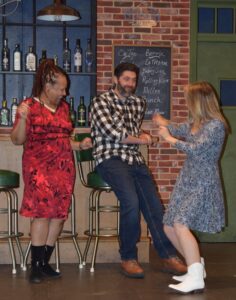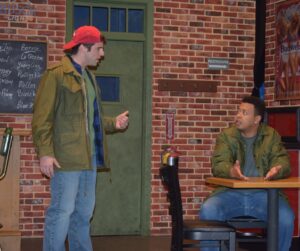
Carlene Lawson, Jim Hopper and Jennifer Lear in SWEAT at Chestnut Hill’s Stagecrafters. Photo by Joanne Davis.
By Ellen Wilson Dilks
Chestnut Hill’s Stagecrafters continue their current season with a production of Lynn Nottage’s Pulitzer Prize winning play, SWEAT. Written in 2015, it deals with racism, class and labor issues, as well as the death of America’s middle class.
Set in Reading, PA, Nottage interviewed several of the city’s residents. At the time, the US Census Bureau listed Reading as one of the poorest cities in the nation. Nottage read an article in the New York times about the city and it inspired her to explore the effects on the residents of the loss of jobs in a major industry in the area: steel. Her first-hand encounter with the townspeople’s economic and emotional struggles pushed her to want to write SWEAT. The Occupy Wall Street movement also generated ideas for the young playwright.
Loss is also a theme in the story—the loss of jobs and security, and the loss of friendships due to the economic strains. SWEAT opened Off-Broadway in 2016 and moved to a Broadway house in 2017. The play was co-commissioned by the Oregon Shakespeare Festival’s American Revolutions series.
Director Suki has assembled a strong team to bring Stagecrafters version of Nottage’s story to their stage. One enters the house and is greeted by a very creditable rendition of a neighborhood bar. With its brick walls, neon beer sign and sports paraphernalia, the viewer is instantly pulled into the blue-collar hangout of the local mill workers. The design and décor is the work of Patricia Mastracchio (with an assist from Mark Grayson); it is rich with details. Gilbert Todd lights the action well, allowing the time shifts from 2000 to 2008 to stand out. A wonderful soundscape—including a great pre-show set—has been created by Chris Sarnowski. Terry McIntyre provided an exceedingly well-crafted and believable fight scene. And the very appropriate costumes are the work of Jen Allegra and Janet Gilmore.
The cast of nine—many newcomers to the Stagecrafters—works perfectly together. The director has staged the piece well and keeps the flow going. She and her actors have created full-bodied people, warts and all. They each embody their character, infusing them with life and passion. For their families. For their way of life.

Lynn Nottage’s SWEAT at The Stagecrafters through April 28. L to R: Ryan Henzes and Oliver Feaster. Photo by Joanne Davis.
Shel Griffin plays Evan, a parole officer who’s frustrated with both the system and some of his clients. The first two vignettes of the play are him dealing with Jason, then Chris, who have both recently been released from 8 years in prison for an assault in 2000. Chris (nicely portrayed by Oliver Feaster, who isn’t afraid of showing his character’s vulnerability) is trying hard to get his life back on track, while Jason (Ryan Henzes is a little too believable at times) is bitter and angry. He has acquired several White Supremacist tattoos on his face during his incarceration. Next, we are in the bar where three co-workers are celebrating the birthday of one. Bartender Stan—very well played by Jim Hopper—keeps a lid on things. He was injured in an accident at the local textile mill, leaving him high and dry. His current job though has brought him some acceptance and peace. Hopper is quite deft at showing all aspects of this man. Aiding him in the running of the bar is Oscar—born and raised in the Reading area, but of Columbian descent. Jose Alejandro Roman beautifully shows the pain inflicted by the ignorance of some towards people of other ethnicities. Rounding out the sort of supporting cast is Jon Owens as the estranged husband of Cynthia—and father to Chris. Owens captures well the mix of the need of an addict—as well as those moments when he is working on recovery. Like so many in this story, he was locked out of his manufacturing job and could not find another. Coping with job loss is a form of grieving; some come out of it stronger, others head into a downward spiral. Owens character is the first to show us both sides of this coin.
Now, for the three friends at the core of the story… Sarah Stryker plays Jessie, a young woman coping with the end of a long-term relationship with her boyfriend by drowning herself in booze. Stryker hits just the right notes in her drunk portrayal without going too far. And then surprises as she reveals Jessie’s truly sweet and supportive nature, as well as her inner strength. Jennifer Lear is a little spitfire as Tracey, who has worked on the floor of the steel mill for 28 years. Lear shows us a tough woman who fiercely stands up for herself and those she loves. She is also the mother of Jason. Her long-time friend, Cynthia, has been at the mill almost as many years, and she is Chris’ mom. Carlene Lawson does a great job in this pivotal role—especially when her character’s promotion to management creates tension between the friends. All of these performers show a real respect for these people, giving the audience everything they’ve got.
Nottage gives then the ingredients with which to create a challenging experience for the audience. The steel industry died out long before the financial collapse of 2008—an event that added to the suffering of people in places like Reading. Most of the characters in the story have spent decades toiling through 10-hour days standing, running very loud and dangerous machines. Their parents and grandparents did it before them. You don’t see that today. Companies lay off workers at the first sign of a possible loss in profits. It has created a culture of job hopping. Why should a worker be loyal to an employer when the employer isn’t reciprocating. And all of this is in the name of the almighty buck. The economy is a big issue in the upcoming election, but it is foolish to blame the current President when what is really going on is corporate greed. Many of the large companies in the US have shown record profits since 2020—even during a global pandemic. And the average American citizen is paying for it.
Okay, rant over…
While this production is not perfect (few are), it has much to offer. SWEAT is a funny, gut-wrenching, challenging piece of theatre. I recommend you check it out.
When You Go: SWEAT contuses this Friday, Saturday and Sunday, and next Friday, Saturday and Sunday. Evening performances start at 8pm, with the Sunday performances starting a 2. The performance running time is a touch over 2 hours—plus a 15-minute intermission. I would recommend it for 17 and over, due to language and violence. The Stagecrafters Theatre is located at 8130 Germantown Ave., in the Chestnut Hill section of Philadelphia [19118]—about a 40-minute drive from Delaware County. The venue is also available via public transportation: board the SEPTA R7 Chestnut Hill East to the Gravers Lane stop [go 3 blocks to your Left upon leaving the station to Germantown Ave.- and then 2 blocks to the left for the theatre] or R8 Chestnut Hill West train to the last stop (8600 Germantown Avenue) on R8 [exit the station on to Germantown Ave., and go right 4 blocks]. The train service is very regular and you can see a timetable at SEPTA.
The theatre is handicapped accessible, with the lobby and restrooms at ground level. Entry into the auditorium is made via two short ramps. Parking is not allowed on the property, but there is nearby street parking, as well as various lots along Germantown Avenue. Patrons with mobility issues can be dropped off at the door and then have their companion go park nearby. For further info about the theatre and the surrounding neighborhood, visit https://thestagecrafters.org/ OR—call 215-247-8881. Reservations can be made online, or by calling 215-247-9913. The Email address is info@thestagecrafters.org
COVID PROTOCOLS: Masks are not required at this time, but Stagecrafters is following all CDC guidelines. So, masking is at the patrons discretion.